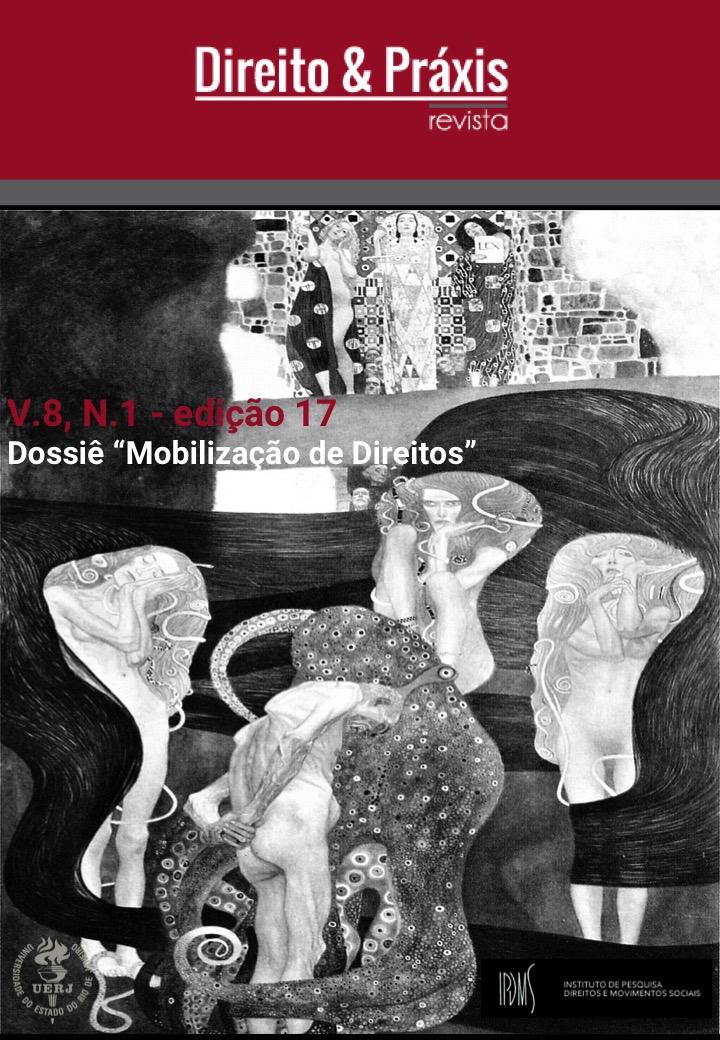A judicialização indireta da saúde: um estudo de caso sobre a experiência de Cachoeiro de Itapemirim/ES / The indirect judicialization of health: a case study on the Experience of Cachoeiro de Itapemirim/ES
DOI:
https://doi.org/10.12957/dep.2017.19801Palavras-chave:
Direito à Saúde Infanto-juvenil, Políticas Públicas de Saúde, Medidas de Proteção Incidentais, Judicialização Indireta da Saúde. / Children and Adolescents Right to Health, Public Health Policies, Incidental Protection Measures, Indirect Judicialization oResumo
DOI: 10.12957/dep.2017.19801
Resumo
O presente trabalho tem por escopo analisar e compreender um tema aparentemente incipiente e ainda não investigado: a judicialização indireta da saúde. O fenômeno cristaliza-se quando questões inerentes ao direito à saúde são levadas ao crivo do Poder Judiciário de forma superveniente ou incidental e não como objeto principal de uma ação ajuizada. Analisou-se, por intermédio da metodologia de estudo de caso, 263 ações cíveis, ajuizadas no decorrer do ano de 2013, na 1ª Vara da Infância e da Juventude de Cachoeiro de Itapemirim/ES. A pesquisa identificou importantes elementos que caracterizam o tema, merecendo destaque o protagonismo do Ministério Público, o qual fora responsável pela ampla maioria dos requerimentos que postulavam a aplicação de “medidas protetivas incidentais” (92,1%) e a alta concentração de pedidos demandados que versavam sobre tratamento contra a drogadição infanto-juvenil (52,2%). Ao final, apontou-se a necessidade de se estabelecer diálogo institucional e interdisciplinar entre o Poder Público constituído, os atores que compõem o Sistema de Garantia de Direitos da Criança e do Adolescente (SGDCA) e a sociedade civil organizada, objetivando elaborar e implementar as políticas públicas de saúde inexistentes, bem como aprimorar aquelas que já estão em pleno funcionamento.
Palavras-chave: Direito à Saúde Infanto-juvenil; Políticas Públicas de Saúde; Medidas de Proteção Incidentais; Judicialização Indireta da Saúde.
Abstract
This work's scope is to analyze and understand a theme apparently incipient and not yet investigated: the indirect judicialization of health. The phenomenon crystallizes when questions inherent to the right to health are examined by the judiciary branch as a superficial matter or incidental form and not as the main object of a filed action. 263 civil actions, filed during the year of 2013 in the 1st Court of Childhood and Youth of Cachoeiro de Itapemirim/ES, were analyzed through case study methodology. The research identified important elements that characterize the theme, with prominence the role of the Public Prosecutor, which was responsible for the vast majority of requirements that they postulated the application of Protective Measures Incidental (92,1%) and the high concentration of requests defendants that focused on treatment against child and adolescent drug addiction (52,2%). In the end, the need to establish institutional and interdisciplinary dialogue between the constituted government, the actors that make up the system of guarantee of rights of the Children and Adolescents (SGDCA) and civil society organizations was pointed out, with the objective of developing and implementing nonexistent public health policies and improving those already in operation.
Keywords: Children and Adolescents Right to Health; Public Health Policies; Incidental Protection Measures; Indirect Judicialization of Health.
Downloads
Downloads
Publicado
Como Citar
Edição
Seção
Licença
Os textos são de exclusiva responsabilidade de seus autores.
É permitida a reprodução total ou parcial dos artigos da Revista Direito e Práxis, desde que citada a fonte.
Este trabalho está licenciado sob uma Licença Creative Commons 4.0, Atribuição-Sem Derivações.
Esta licença permite copiar e redistribuir o material em qualquer suporte ou format para qualquer fim, mesmo que comercial, desde de que citada a autoria original.
This work is licensed under a Creative Commons Attribution 4.0 International License.




